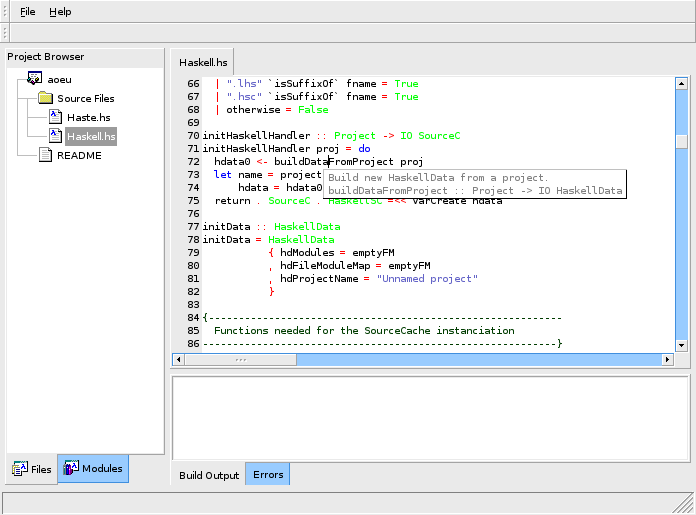Difference between revisions of "Haddock/Development ideas"
< Haddock
Jump to navigation
Jump to search
(document parameters of function arguments) |
(qualification of identifiers) |
||
| Line 13: | Line 13: | ||
* Haddock should emit the documentation about instances. For example, it's important to document that the Data.Map instance of Foldable only folds over the values and not the keys. |
* Haddock should emit the documentation about instances. For example, it's important to document that the Data.Map instance of Foldable only folds over the values and not the keys. |
||
* There should be an annotation to include a function's entire definition in the documentation. This would be useful for functions like <hask>(.)</hask> and <hask>mapM</hask> where the definition is the clearest possible documentation, and for QuickCheck properties that specify the behavior of a library. |
* There should be an annotation to include a function's entire definition in the documentation. This would be useful for functions like <hask>(.)</hask> and <hask>mapM</hask> where the definition is the clearest possible documentation, and for QuickCheck properties that specify the behavior of a library. |
||
| + | * Optionally [http://www.haskell.org/pipermail/haskell-cafe/2008-January/038211.html show qualifications of identifiers], that is print <hask>Sequence.map</hask> rather than <hask>map</hask>, <hask>Music.T</hask> rather than just <hask>T</hask>. The option for haddock could be <code>--qualification QUAL</code> |
||
| + | ** <code>none</code> (default) strip off qualification (just <hask>map</hask>) |
||
| + | ** <code>orig</code> show the identifiers as they are written in the module (e.g. <hask>map</hask> or <hask>List.map</hask>) |
||
| + | ** <code>full</code> show all identifiers with full qualification (<hask>Data.List.map</hask>) |
||
* It should be possible to [http://www.haskell.org/pipermail/haskell-cafe/2007-August/030390.html document parameters of function arguments]. |
* It should be possible to [http://www.haskell.org/pipermail/haskell-cafe/2007-August/030390.html document parameters of function arguments]. |
||
<haskell> |
<haskell> |
||
| Line 20: | Line 24: | ||
-> a {- ^ global output -} |
-> a {- ^ global output -} |
||
</haskell> |
</haskell> |
||
| + | : This is also of interest for other type constructors like the pair type constructor <hask>(,)</hask>. |
||
Revision as of 20:58, 16 January 2008
There would be a number of benefits if GHC's parser were extended to understand the Haddock documentation markup and then Haddock changed to use the GHC API:
- Haddock would get full support for GHC's various syntactic extensions.
- Haddock would understand
{#- LINE -#}pragmas which would allow it to generate links to the original source code. - Haddock would get much better error messages.
- Haddock could infer types for functions with no explicit type signature.
- GHCi and IDEs like hIDE and Visual Haskell would be able to display API documentation in more convenient ways like in this Haste screenshot:
- Haddock could accept module parameters with space after "-- #" ("-- #hide" is accepted nowadays, but "-- # hide" not)
- It would be good to have a recursive flag that would operate on all the .hs and .lhs files under a single directory.
- Haddock should emit the documentation about instances. For example, it's important to document that the Data.Map instance of Foldable only folds over the values and not the keys.
- There should be an annotation to include a function's entire definition in the documentation. This would be useful for functions like
(.)andmapMwhere the definition is the clearest possible documentation, and for QuickCheck properties that specify the behavior of a library. - Optionally show qualifications of identifiers, that is print
Sequence.maprather thanmap,Music.Trather than justT. The option for haddock could be--qualification QUALnone(default) strip off qualification (justmap)origshow the identifiers as they are written in the module (e.g.maporList.map)fullshow all identifiers with full qualification (Data.List.map)
- It should be possible to document parameters of function arguments.
fix ::
( a {- ^ local argument -}
-> a {- ^ local output -} )
-> a {- ^ global output -}
- This is also of interest for other type constructors like the pair type constructor
(,).
